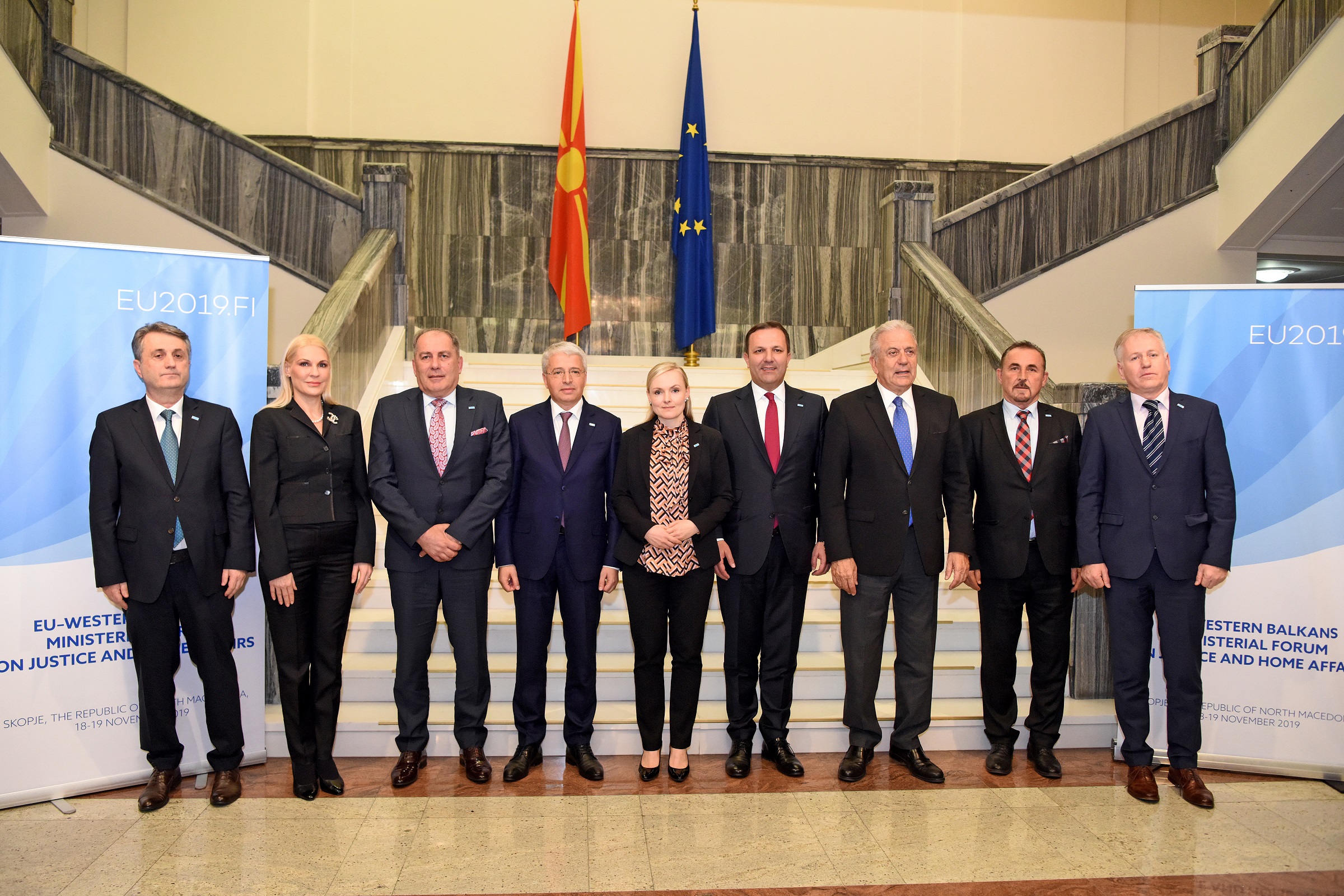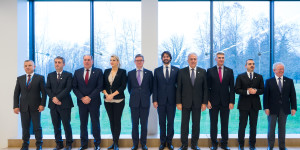18-19 NOVEMBER 2019, SKOPJE
The Ministers of Justice and Home Affairs of Finland, representing the Presidency of the Council of the EU, together with the European Commission, represented by the European Commissioner for Justice, Consumers and Gender Equality and the European Commissioner for Migration, Home Affairs and Citizenship, met on 18-19 November 2019 with their counterparts from the Western Balkans at the annual EU-Western Balkans Ministerial Forum on Justice and Home Affairs. The meeting was also attended by representatives of the incoming Croatian Presidency.
Rule of Law and Judicial Reforms
The Ministers recognised that in the Western Balkans, the rule of law is a crucial aspect of democratic transformation. As such it lies at the very core of accession negotiations as the key benchmark against which readiness for EU membership is assessed. The Western Balkans reaffirmed their commitment to reinforce their reform efforts and bring tangible progress in the area of rule of law and fundamental rights. They also reaffirmed to extend rule of law advisory missions with increased support from Member States and from the EU, and to enhance monitoring of reforms through more systematic, case-based peer-review missions.
Where the necessary institutional and legislative framework is already in place, the Ministers agreed that greater focus needs to be placed on the effective implementation of reforms, including producing solid track records of results. The Ministers took note of the conclusions and recommendations of the thematic evaluation of EU support for Rule of Law in neighbourhood countries and candidates and potential candidates of enlargement. The Commission confirmed its continued support for reforms aiming to strengthen the rule of law in Western Balkans through political, technical and financial assistance. Nevertheless, it underlined that this support is conditional upon the effective implementation of reforms.
As a part of strengthening the rule of law in the region, the Ministers agreed on the need to prioritise the reform of the top-level judicial institutions. It was recognised that it is crucial to refrain from political interference, in particular, in the self-governing bodies of the judiciary, in order to ensure full alignment with European standards on independence, integrity, transparency and accountability. The Ministers acknowledged the importance of effective justice systems for citizens and for businesses. The Ministers also recognised that judicial cooperation in the EU is based on mutual recognition, and that this requires strong mutual trust. Ministers agreed on the need to continue work on measuring the actual performance of justice systems. They welcomed the ‘Dashboard’ project soon to be implemented by the Council of Europe and the regional justice surveys implemented by the World Bank.
Ministers agreed that further efforts are necessary to reduce case backlogs. They acknowledged the substantial support received through EU projects and committed to further prioritising measures that will contribute to the overall efficiency of the judiciary. In this respect, the Ministers acknowledged the importance of digitised Case Management Systems (CMS) and agreed to prioritise the implementation of CMS so that they can be fully functional by end 2021.
Fight against corruption
The Ministers acknowledged the importance of stepping up efforts to prevent and fight against corruption. As an important contribution to this goal, they committed to the swift implementation of the recommendations made by GRECO to the extent those fall within the mandate of GRECO and alignment to the latest EU acquis to ensure better protection of whistle-blowers and transparency of beneficial ownership.
The Ministers reaffirmed their commitment to fight corruption and organised crime, including capacity building for corruption prevention, and to introduce trial monitoring in the field of serious corruption and organised crime, as well as to improve functioning of independent and pluralistic media and civil society. The Ministers underlined that a high level and political corruption needs to be combatted in a clear and consistent way. Ministers therefore recognised the importance of a solid track record of investigations, prosecutions and convictions. Well-planned anti-corruption strategy or action plan would help to prevent and combat corruption.
Prison conditions and use of alternative sanctions
The Ministers acknowledged that effective criminal sanctions play an important role in protecting the citizens and ensuring security, and that sanctions and measures used and the way in which they are enforced contribute to the prevention of reoffending and thereby affect security in society. The Ministers further acknowledged the importance of improving prison conditions to ensure that they meet Council of Europe standards. They recognised that poor prison conditions can also have an effect on judicial cooperation in criminal matters.
The Ministers underlined that serious offences require appropriate responses, and that detention is a necessary instrument in criminal sanctions systems. They acknowledged, however, that there is broad consensus that detention should be used only as a last resort. The Ministers confirmed that having legislation, where appropriate, that allows to make use of alternative measures to detention, can bring benefits to society as a whole. The Ministers underlined that the sharing of best practices between the EU and the Western Balkans is a useful way to improve national legislation and procedures. The Commission underlined that the EU has provided financial assistance for the improvement of prison conditions in the Western Balkan.
Cooperation with EU Agencies, Entities and Programmes and Elections
The Ministers committed to examine and increase cooperation with the EU’s agencies, entities and programmes where appropriate. The Ministers underlined that judicial training of national judges, prosecutors, court staff and other legal practitioners is vital. Ministers expressed their commitment to judicial training and welcomed the training opportunities offered by the European Judicial Training Network (EJTN).
The Ministers recognised the importance of free, fair and transparent elections in line with international standards and commitments. The Commission underlined the importance of addressing long-standing weaknesses throughout the electoral cycle (in particular raising the capacity of election management bodies, ensuring the accuracy of voter lists and effectively preventing and sanctioning electoral fraud). The Commission reiterated that the EU-funded project ‘Support to Elections in the Western Balkans’ can usefully assist in this respect. Ministers welcomed the development of the Electoral Recommendations Database.
The Ministers underlined that further efforts and political will are needed to address ODIHR electoral recommendations (EU in the case of Kosovo*) and undertook to continue the work on electoral reform in cooperation with ODIHR.
Home Affairs session
Migration and border management
The Ministers stressed that ensuring effective border management and fighting migrant smuggling remain the top priorities for both the EU and the Western Balkans. They recalled the importance of respecting the right to apply for asylum and the international law principle of non-refoulement. The Ministers also noted the importance of identifying vulnerable groups.
The Ministers addressed the recent increased number of irregular border-crossings in the Western Balkans and the criminal activities of migrant smuggling networks and committed to tackle these issues through continued and enhanced cooperation between EU and its Member States, JHA Agencies and Western Balkans partners. The Ministers recognised the close links between migrant smuggling and other criminal activities such as extortion for money, arms smuggling and connections to international organized criminal networks. The ministers committed to continue and enhance cross-border cooperation and information exchange on these issues.
The Commission expressed concerns over the current migratory situation in Bosnia and Herzegovina, took note of the commitment of Bosnia and Herzegovina to take urgent measures to address this situation, including by increasing suitable reception capacities with EU support.
The Ministers welcomed the progress made regarding European Border and Coast Guard Status Agreements with Bosnia and Herzegovina and North Macedonia as well as the recent signing of the Status Agreement with Montenegro and, today, Serbia. The participants of the Forum were given an update on the positive operational results achieved by the joint operation in Albania. The Ministers committed to finalise and swiftly operationalise the Status Agreements with the remaining Western Balkans partners.
The Ministers agreed to deepen cooperation to mitigate all migratory challenges, including enhancing returns in full respect of fundamental rights.
Terrorism and violent extremism
The Ministers acknowledged that terrorist networks remain a global security threat. Ideologies of intolerance and violence pose a challenge to our shared values of peace, security, human rights and the rule of law.
The participants welcomed the Western Balkans partners’ situational awareness and political will to counter terrorism and radicalisation, and committed to further address its causes and build resilient and cohesive societies. Effectively addressing the issue of returning foreign terrorist fighters and their families, presents a major challenge to the Western Balkans and Europe as a whole. Close cooperation and preparedness, through sharing all relevant information, to prevent the undetected crossing of borders by Foreign Terrorist Fighters and through support national criminal investigation by securing evidence, exchanging information and ensuring that terrorists are effectively brought to justice, is essential.
The Ministers recalled the EU-Western Balkans Joint Action Plan on Counter-Terrorism for the Western Balkans, adopted in 2018 and welcomed the recent signing of the bilateral arrangements, committing to implement the priority actions in 2019 and 2020.
Organised crime, including human trafficking and smuggling of drugs and weapons
The Ministers reiterated the importance of the EU Policy Cycle in acting together on the ground, to fight cross-border crime.
Effectively fighting organised crime requires comprehensive policies based on national systems and international cooperation. Strengthening cooperation and coordination between the relevant EU and Western Balkans intelligence, law enforcement, prosecutorial and judicial authorities could intensify the exchange of information and streamline investigations. In this respect, the Ministers committed to strengthening operational partnerships, and especially with Europol.
The Ministers agreed that the cooperation between the EU and the Western Balkan partners on trafficking of human beings, migrant smuggling and trafficking of illicit drugs and weapons continues to be a key priority. The Ministers called for targeted measures to confiscate criminal assets to avoid that proceeds of crime are reinvested in furthering criminal activities including corruption.
The Ministers recalled that trafficking in human beings is a grave violation of human rights and a serious form of organised crime. Prevention must remain at the core of all EU and Western Balkans anti-trafficking action.
The Ministers noted that the Western Balkans is the geographical focus of the European Firearms Experts (EFE) and the cooperation has benefited all parties. The Ministers discussed the evaluation of the 2015-2019 action plan between the EU and the Southeast Europe region on the illicit trafficking of firearms and underlined the need for further efforts.
The Ministers agreed to continue cooperation on all the issues discussed at the Justice and Home Affairs Ministerial Forum and to continue the discussions at the next Ministerial Forum.
* This designation is without prejudice to positions on status, and is in line with UNSCR 1244/1999 and the ICJ Opinion on the Kosovo declaration of independence.




